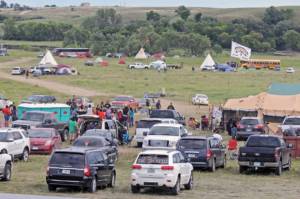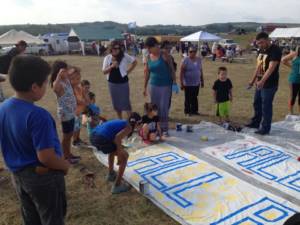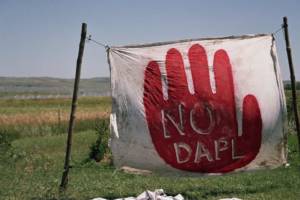This blog was written by Becca Krasky. Becca is from Minneapolis, MN and organizes for fossil fuel divestment at Macalester College.

I don’t have words powerful enough to describe my experience at the Red Warrior Camp on the Standing Rock Reservation in North Dakota. I care deeply about this fight so I’m going attempt an explanation anyways.
A few weeks ago, I had the opportunity to travel from my home in Minneapolis, Minnesota to the Standing Rock Reservation in Cannonball, North Dakota, where indigenous water protectors are fighting to stop the construction of the Dakota Access Pipeline under the Missouri River. Thousands of people are camped alongside the Cannonball River at the Red Warrior and Sacred Stones camps. Tepees stand alongside tents filled with families, elders, and young people advocating for the protection of the land, water, and climate.

As a non-native person coming from Minnesota – it was really important to consistently hold myself to observing and honoring the community I was entering. I was definitely holding some fear about how my presence would be interpreted but upon arriving I felt welcome to show support in the ways that I could, while also taking direction from the people around me. My role while at the camp was in food prep and I had the invaluable experience of building relationships with others while we opened cans of vegetables, cut tomatoes, and zucchini, washed dishes and served dinner to hundreds of people each night.
As a college student working on a fossil fuel divestment campaign, it was such an important experience for me to find a way to support this organizing being led by frontline communities. I felt honored to sit around the fire each evening and listen to people sharing their stories. Indigenous folk from all over the country told of heartbreaking experiences of the land, air, and water being poisoned in their communities. Young people spoke of their hopes for a more just future, one in which Native American treaties are adhered to and the earth and its inhabitants respected. The overwhelming message was one of optimism and empowerment.

Friday brought the movement big news — the Obama administration suspended construction on part of the Dakota Access Pipeline. This is proof that the organizing on the ground is working but this fight is long from over. If you’ve either been following this powerful organizing from afar or if you are considering going to the Standing Rock camps here are a few things you can do to support the #NoDAPL fight:
- Join the resistance on the ground! If you have the resources and time and choose to visit remember that you are a guest of the Standing Rock tribe. Respect the land, water, and air of the community. Don’t bring drugs, alcohol or weapons of any kind. Bring your own supplies and your own food. If you are able, collect donations of supplies from your friends and family to bring along. If you identify as female, bring a long skirt for ceremonial purposes. And most of all, listen, participate, and help out in any way that you can.
- Join the #NoDAPL 9.13.16 Day of Action as part of a two-week solidarity call to stand with the indigenous communities fighting on the frontlines. There might already be an action planned in your city or you can sign up to host one yourself.
- Donate to the legal defense fund and/or the camp’s general expense fund. Nonviolent resistance involves lots of expensive legal repercussions, and running a camp for thousands of people is also costly!
- Raise the issue! Reach out to elected officials on all levels about the pipeline. Talk about the DAPL resistance on social media, using #NoDAPL. Talk to your friends, family, neighbors, babysitters, co-workers, professors, teachers, and everyone else about why you support this pipeline resistance!
This pipeline can and will be defeated but this fight isn’t going to stop there. People are going to leave camp ready to mobilize to protect the air, water, and climate of their own home communities, and our movement will know even more deeply what it means to work together for climate justice from all corners of the country.

The world is ready for us to go fossil free, stop investing in companies that are poisoning people, keep fossil fuels in the ground and stop the construction of infrastructure projects that threaten culture and communities.